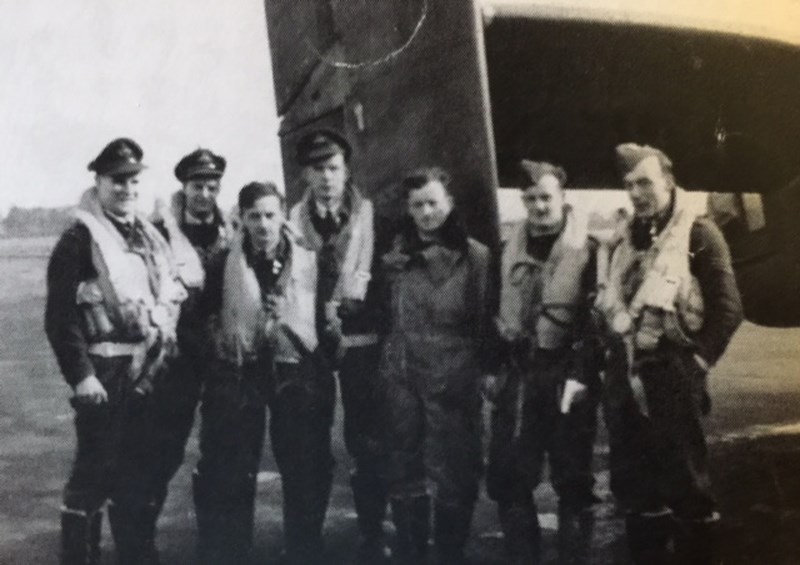Whatever it was, it was coming at them fast.
Peering out of the windows at the ground below, the crew of the Royal Air Force (RAF) Halifax bomber, including its navigator, 22-year-old Flight Officer Douglas Milton, couldn’t quite make out what type of anti-aircraft ordnance was being lofted upwards at them. But it was rapidly rising on a column of smoke and flames that lit up the dusky night sky.
“We’d seen all kinds of ack-ack fire before. This was something different,” recalled Milton, now 95 and a resident of The Maple Residences in Steveston. “It was coming right at us. But we managed to get out of the way and it flew up and past us.”
The sighting, as they flew over occupied Europe, was so unusual the crew made a point of reporting exactly what they had seen on their return to base, noting a detailed description and best estimation of its origin from the ground.
Good thing, too, because what RAF experts realized from the information was what they had witnessed was not intended to try and knock Milton’s bomber out of the sky. It’s true target was much further away, since it was a German V-2 rocket — the world’s first long-range (320 km), guided ballistic missile that was designed to rain down on Allied cities.
“I am hoping that perhaps, because of what we saw and reported, we were able to stop more of them being launched,” Milton said.
That is one of many stories the Regina, Sask. native can tell from his time during the Second World War that included completing an impressive 43 missions over enemy territory. For accomplishing that feat, and more, he was awarded the Distinguished Flying Cross, bestowed on those who demonstrated acts of valour, courage or devotion to duty.
“We were pretty lucky,” Milton said. “The average lifespan for a bomber crew was 10 missions. We managed to do a lot more.
“It was scary, though, no doubt about it. I remember my mind going blank the very first time up, most of it from not knowing what to expect, and not being able to remember how to properly plot the course. But we managed,” he said. “You couldn’t dwell on the fear you experienced, because you knew you’d be back up there again pretty soon.”
He credits his pilot, a Scot named Bill Foote, for their longevity.
“He was a very good pilot. Very safe,” Milton said. “He never took any silly risks. You’d hear about other pilots doing things like flying low to chase cows and end up killing the whole crew. Bill never did anything like that. He got us back home safe.
“And the rest of the crew was good, too, and concentrated on the business at hand all the time.”
That wasn’t to say the seven-crew RAF Halifax didn’t get a scratch. There were plenty along the way. Milton particularly remembers the furious bombardment German anti-aircraft batteries waged on flights of Allied bombers as they neared their targets.
“We once came back with about 50 holes in the fuselage from the ground fire we had to fly through,” Milton said. “That plane had to be scrapped. It was way beyond being airworthy anymore.”
While Milton trained with the Royal Canadian Air Force, when he reached England a bureaucratic mix up landed him in the RAF. It didn’t matter though, as his crew members accepted him and another fellow Canadian, Jack Patterson, as one of their own.
That sense of camaraderie also extended beyond Milton’s group. He recalled that, on one occasion, his Halifax was so badly damaged by German anti-aircraft fire that they had to make an emergency landing, well short of their home airfield.
“We landed at one run by the Americans,” he said, adding they were not the only crew seeking emergency refuge that night.
“There was a German plane that was in trouble and made a landing there, too,” he said.” And what always struck me was that when you see stories of situations like that in movies, these enemy pilots would be in danger of being massacred when they landed.
“But in actual fact, on that night, the Americans welcomed us and the Germans into their mess for something to eat and gave us all a place to sleep.”
Milton said he wasn’t surprised at the reception.
“We never had any particular animosity towards these Germans who were trying to kill us,” he said. “It (the war) wasn’t their fault, as individuals.
“They were doing their job the same as us.”



